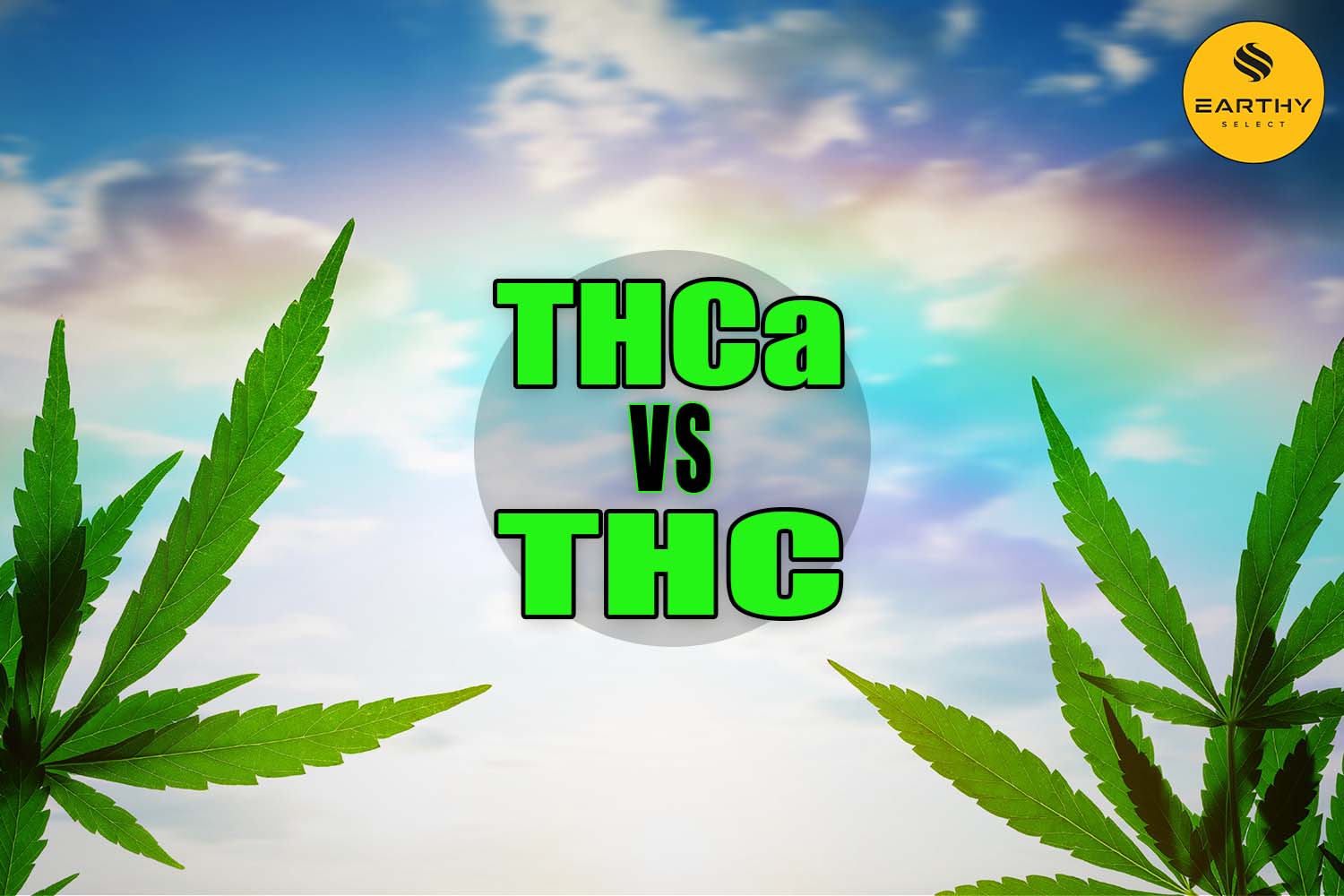THCa vs THC
The cannabis plant has been a focal point of scientific research and consumer interest for many years. As cannabis use becomes more widespread, understanding its chemical compounds and their effects is crucial. Among the many cannabinoids found in cannabis, two of the most prominent are THCa (tetrahydrocannabinolic acid) and THC (tetrahydrocannabinol). Although these compounds share a similar chemical structure, they exhibit distinct properties and effects [1]. Here, we’ll explore the differences between THCa and THC, highlighting their wellness effects, psychoactive properties, and potential benefits.
The chemistry behind THCa vs THC
THCa is a naturally occurring cannabinoid found in fresh cannabis plants. It exists in the raw form of cannabis and contains a carboxylic acid group, which distinguishes it chemically from THC. In contrast, THC is the primary psychoactive compound responsible for the intoxicating effects typically associated with cannabis use. Unlike THC, THCa does not produce psychoactive effects because the carboxylic acid group prevents it from binding effectively to certain receptors in the brain. However, when exposed to heat, THCa undergoes a chemical reaction in a process called decarboxylation, which removes the carboxyl group and converts THCa into THC [1].
Psychoactive properties: THCa vs THC
The most significant difference between THCa and THC lies in their psychoactive properties. For instance, THC has intoxicating effects including altered perception, euphoria, and relaxation. These effects occur when THC interacts with the body’s endocannabinoid system (ECS), specifically the CB1 receptors in the brain [2]. Notably, the level of Delta-9 THC in cannabis determines if it is a federally controlled substance [3]. Cannabis with no more than 0.3% Delta-9 THC is hemp whereas if it has over 0.3% Delta-9 THC, it is marijuana, according to the US Farm Bill.
On the other hand, THCa is non-psychoactive and does not produce such effects when consumed in its raw form. Thus, for cannabis consumers looking to avoid intoxication while exploring the plant’s potential therapeutic properties, consuming THCa through raw cannabis can be an attractive option. For example, some wellness-oriented individuals use freshly harvested cannabis in raw food supplements or juice it to preserve the THCa content [4].
Delta-8 THC vs Other Cannabinoids
Does THCa have potential therapeutic benefits?
Although THCa does not produce psychoactive effects, researchers continue to study it for potential therapeutic properties, including in the areas of anti-inflammation and neuroprotection. Though scientists have not proven that THCa can successfully manage conditions such as inflammatory bowel disease, arthritis, or neurodegenerative diseases like Alzheimer’s and Parkinson’s, the current research looks promising enough to look closer for potential THCa-based medicines in the future [5].
THC: more than just psychoactive effects
While many know THC for its psychoactive properties, the cannabinoid may also offer wellness benefits. For example, medical cannabis patients often turn to THC for purported help with pain perception, appetite stimulation, and relieving feelings. However, medical marijuana patients typically receive the guidance of a physician who may recommend cannabis for particular medical needs. Notably, physicians sometimes recommend medical marijuana to people undergoing chemotherapy to address nausea and vomiting, though only a handful of THC-based medications have been FDA-approved for this [6]. Furthermore, THC may be a potent PPARγ agonist, which suggests it may have other wellness properties, although more research is needed to confirm this [7].
Despite its benefits, THC has some potential adverse effects. For example, some users can experience dizziness, paranoia, or increased heart rate after consuming THC. Also, prolonged use can lead to withdrawal symptoms when stopping consumption, and cannabis flower smoke can impair lung health if frequently inhaled [8]. Moreover, some drug tests detect THC metabolites, which means consuming THC can result in a positive test even if consumed legally [9].
Consumption methods for THCa and THC
The way individuals consume cannabis determines whether the user will primarily experience the effects of THCa or THC. In other words, some people consume raw cannabis buds by juicing cannabis flower into smoothies or taking raw THCa tinctures. These consumption methods preserve the tetrahydrocannabinolic acid and its potential wellness benefits without converting the cannabinoid into THC [4].
However, when cannabis is heated—through smoking, vaping, or cooking—the THCa flower undergoes decarboxylation and becomes THC. This method typically results in the intoxicating effects associated with THC flower. However, those who want to avoid the psychoactive high can consume THCa flower in its raw state. This way, users can enjoy the wellness benefits of the cannabis plant without intoxication [1].
Does THCa Get You High? It’s Complicated
Legal status: THCa vs THC
The legal status of THCa vs THC is another crucial point of distinction. In other words, THCa does not produce intoxicating effects, and most jurisdictions deem it legal as long as it is hemp derived and contains 0.3 % or less Delta-9 THC. However, the conversion of THCa into THC through heat complicates its legal standing in certain states, as cannabis flower containing high levels of THCa could become intoxicating. Even so, legal experts consider THCa flower with no more than 0.3 % Delta-9 THC compliant under the terms of the 2018 Farm Bill.

In contrast, the federal government currently considers Delta-9 THC a controlled substance due to its psychoactive effects. Even areas that allow medical cannabis use sometimes impose strict regulations surrounding Delta-9 THC levels in cannabis products. For example, in some places, THC oil and other cannabis products are legal only for medical purposes. However, many states have now embraced broader legalization [1].
Buy THCa Flower in Georgia: Buying Guide
THCa vs THC: similar chemical structure, distinct properties
While THCa and THC share a similar chemical structure, they exhibit distinct properties. More specifically, the raw form of THCa in fresh cannabis plants does not interact with the brain’s CB1 receptors the same way that THC does. As a result, THCa users who consume the plant raw do not experience psychoactive effects as they might in THC. However, once the user converts THCa into THC through heat, it becomes the compound responsible for the typical “high” associated with cannabis use [10].
Delta-8 vs Delta-9 Gummies- Which Should You Try?
Conclusion: choosing between THCa vs THC
The choice between THCa vs THC depends on individual needs and preferences. For those seeking potential wellness benefits without the high, THCa flower and other raw cannabis products present viable options. Indeed, consumers can benefit from its potential wellness properties. However, research regarding its efficacy as an anti-inflammatory, neuroprotective agent, and other medicinal benefits is still inconclusive. On the other hand, healthcare professionals sometimes recommend medical cannabis to individuals who seek pain relief, appetite stimulation, or relief from nausea. However, the debate over its efficacy in these areas continues inconclusively with evidence on both sides [11]. For guided treatment for any condition, seek the advice of a physician or health care professional.
As the cannabis industry continues to grow and cannabis research progresses, both THC vs THCa continue to gain recognition for their respective effects. However, it’s crucial to understand each of these cannabinoids to make informed decisions about how best to incorporate cannabis into your wellness or recreational routines.
Visit Earthy Select for a wide range of THCa flower strains, THCa concentrates, and more!
Medical Disclaimer / Legal Disclaimer – Information is provided for educational purposes. It does not and is not intended to constitute legal advice or medical advice. We attempt to be accurate and up-to-date, but the legality of cannabinoids and the science of cannabis are evolving. The author is neither a legal professional nor a medical expert. Before buying or using any products, you should check with your local authorities and medical providers.
References
- What is THCa?
- A Simple Guide to the Endocannabinoid System
- Drug Fact Sheet: Marijuana/Cannabis
- What Are The Potential Benefits of THCa Flowers?
- What Is THCa (Tetrahydrocannabinolic Acid)?
- Mayo Clinic: Medical Marijuana
- PPARα and PPARγ Are Expressed in Midbrain Dopamine Neurons and Modulate Dopamine- and Cannabinoid-Mediated Behavior in Mice
- Weed Withdrawal
- What to Know About How Long Marijuana Stays in Your System
- THC vs. THCA: What are the Differences and Benefits
- Marijuana as Medicine? The Science Beyond the Controversy
Frequently Asked Questions
What is the key difference between THCa vs THC?
THCa is the non-psychoactive precursor to THC, found in raw cannabis. When heated, THCa converts into THC, which produces psychoactive effects [10].
Does THCa get you high like THC?
No, THCa does not cause intoxication or produce psychoactive effects on its own. However, when heated, it decarboxylates, converts to THC and becomes psychoactive [1].
Can consuming raw hemp cannabis provide the same effects as consuming THC?
No, consuming raw cannabis primarily delivers the benefits of THCa, which has potential wellness properties without the intoxicating effects of THC [10].



